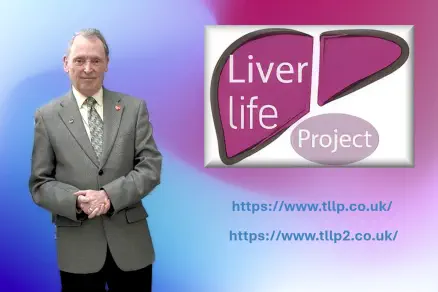

Talking from an empathetic view point
Understanding Hepatic Encephalopathy (HE) can bring about an element of acceptance and hopefully a sympathetic
understanding that this is now a mental health condition.
Those often spoken, cruel and nasty words and actions have no substance or meaning; as no sooner said,
they become forgotten.

Welcome
What many people fail to realise is that when a family member develops an HE condition, it doesn’t just affect the patient, but also everyone in
the household and beyond.
Friends may distance themselves due to the erratic behaviour and inappropriate foul
language.
Children may struggle to understand the sudden changes in mood and behaviour.
The wife/husband, spouse, will now have to take on the role of a carer. Many may struggle
with this challenge as they may feel unappreciated and unloved. This condition can be the
cause of many a marriage breakup. However, those who stay and accept this challenging
role are the unsung heroes of this condition, and are proof that love really can conquer all.
This condition ultimately affects the Quality of Life of not only the patient, but that of the carer too. They may often feel isolated and believe
that they have nowhere to turn, as no one else quite understands what living with someone with a HE condition is really like. They, too, may
develop feelings of depression and anxiety as they struggle to cope.

Back in 2020, the Liver Unit of the Hospital Clinic in Barcelona conducted a study entitled, “Psychological Burden of Hepatic Encephalopathy
on Patients and Caregivers”: https://pmc.ncbi.nlm.nih.gov/articles/PMC7263656/
This study involved fifteen patients with cirrhosis and episodic or persistent HE, and their corresponding informal caregivers were included.
Semistructured interviews were performed with patients and caregivers.
Personal experience with clinical symptoms. Patients and Caregivers reported their experiences with the symptoms of HE.
The first episode of HE caused a very significant impact that was reported with deep feelings, mainly of fear, anger, misery, anxiety, and
sorrow, which persisted with time. Symptoms causing more psychological impact on patients were impaired ability to walk and speak. All
effects were associated with a marked impairment in Quality of Life (QoL). The psychological impact was also marked in caregivers who had a
major burden, as assessed by the Zarit score: https://wai.wisc.edu/wp-content/uploads/sites/1129/2021/11/Zarit-Caregiver-Burden-
Assessment-Instruments.pdf. Moreover, QoL, particularly the mental component score, was markedly impaired in caregivers at an intensity
similar to that of patients.
Some examples are as follows:
Carer: “Yesterday, it started again with…the speech. I recognised it Immediately with the speech, it seems that he is…drunk…and then the
movement, because he is very slow, very slow with the movements, and then…. He gets very clumsy, much more clumsy.”
Patient: “I used to speak fluently, my speech was very fluent,…but now it is very hard to find the right words. It is very difficult.”
Patient: “I would have preferred to have ascites, since it can be punctured. I know … other
complications like varices can be treated. One banding and the problem is solved. But … the
encephalopathy is very difficult to handle.”
Patient: “I remember I was disoriented and talking very slowly… I felt nervous, increasingly
nervous and irritated.”
Patient: “I could not speak well…and had a complete disorientation… I did not know what I
was saying and where I was going ….”
Patient: “Very distressing. Because I wanted to move forward, but my legs we're going sideways they were not listening to me ….”
Carer: “There were moments in which he could not walk. He lost his balance… and all these things.”
Fear … “I’m not afraid to die, but I worry about what will happen to my wife and daughter. It is really scary…I try to do my best with food and
diet…so that it doesn’t happen again… I live in fear he’s going to have another episode. I have so much to do and worry when I’m not with him …
he should be my priority, but I have so many other things to do”.
Anxiety. “When you have encephalopathy, you’re shit and you don’t have a right to anything (in comparison to the way people treat cancer
patients). The problem is that you don’t have a life, or not living life”.
Sorrow. “He has become superselfish, superimpatient … It's only him 100% of the time. There is no husband–wife relationship, now it’s
patient–carer. He doesn’t look at me as his wife anymore; I’m just the person who looks after him. Living like this … I just want, I want some
quality of life”.
Anger. “This isn’t living, it's existing, having to care 100% of the time, 24 hours a day. There are times when I’m so angry and frustrated,…I
would like to do things I can’t…I’d really like to travel”.
So, here we are, some 5 years later, and sadly, the voice of the careers often remains silent and ignored. These heroes need to be listened to.
A Case in point:

The challenging role of a hepatic encephalopathy (HE) caregiver
Caring for someone with Hepatic Encephalopathy (HE) is a multifaceted role requiring both practical assistance and emotional fortitude.
Here's a breakdown of the key responsibilities:
1. Direct care and household support:
Daily Living Activities: Assisting with tasks like bathing, dressing, grooming, and managing household duties such as shopping, meal
preparation, and cleaning.
Managing Finances: Providing support with managing finances and other essential household affairs.
Ensuring safety: Monitoring the patient and creating a safe environment to prevent falls or other injuries due to potential agitation or
confusion caused by the disease.
Dietary management: Assisting with diet changes, including ensuring a high-protein, calorie-rich diet, avoiding fasting, and providing
appropriate snacks, especially before bedtime.
Medication management: Helping the patient obtain and take medications as prescribed, and monitoring for side effects or non-
adherence.
Scheduling and Transportation: Managing appointments and ensuring transportation to healthcare provider appointments, social
events, or other outings.
2. Navigating the healthcare system:
Understanding the healthcare team: Learning about the roles of different specialists involved in the patient's care and how to work
collaboratively within the healthcare system.
Communication & advocacy: Communicating with healthcare and social service providers on behalf of the patient, and advocating for
their interests in all situations.
Monitoring symptoms: Watching for signs and symptoms of HE progression or complications, as well as medication side effects, and
promptly reporting any changes to the healthcare provider.
3. Emotional and psychological support:
Active Listening: Listening to the patient's concerns and providing necessary emotional support, acknowledging the frustration and
emotional burden they may experience.
Coping with Emotions: Finding healthy ways to manage the emotional toll of caregiving, potentially seeking support from other
caregivers, support groups, or professional counsellors.
Remembering the Individual: Focusing on the person they are, not just their illness, and understanding that changes in behaviour are
likely disease-related.
Essential elements for caregivers:
Education and understanding: Learning about HE, its symptoms, potential complications, and management strategies to better
understand and cope with the challenges.
Self-Care: Prioritising personal well-being by maintaining adequate rest, healthy eating habits, exercise, engaging in hobbies, and
seeking support when needed.
Building a support network: Seeking help from family, friends, or other caregivers to share responsibilities and find emotional support.
Seeking professional help: Consulting with specialists, including hepatologists, dietitians, social workers, and counsellors, for guidance
and tailored support.
Resources for support:
British Liver Trust: Provides online and face-to-face support groups, and a nurse-led helpline: https://britishlivertrust.org.uk/
The British Liver Trust also oversee an online support group page with “HealthUnlocked”. Here other people can share their
experiences and offer advice and support: https://healthunlocked.com/britishlivertrust
Carers UK: Offers general help and advice, tools, and resources for all types of caregivers: https://www.carersuk.org/
Caregiving for someone with HE is undeniably demanding, but with adequate knowledge, support, and self-care strategies, caregivers can
navigate the challenges and enhance the quality of life for both themselves and their loved ones.



















This site is for information only. It’s not for profit but aims purely to raise awareness of these associated medical conditions and offer
support where possible for Alcohol-related Liver Disease. It was never my intention to breach any copyright infringement, but to only use
pictures and digital media to illustrate certain points. After all, a picture is worth a thousand words, and clarity is so important.































